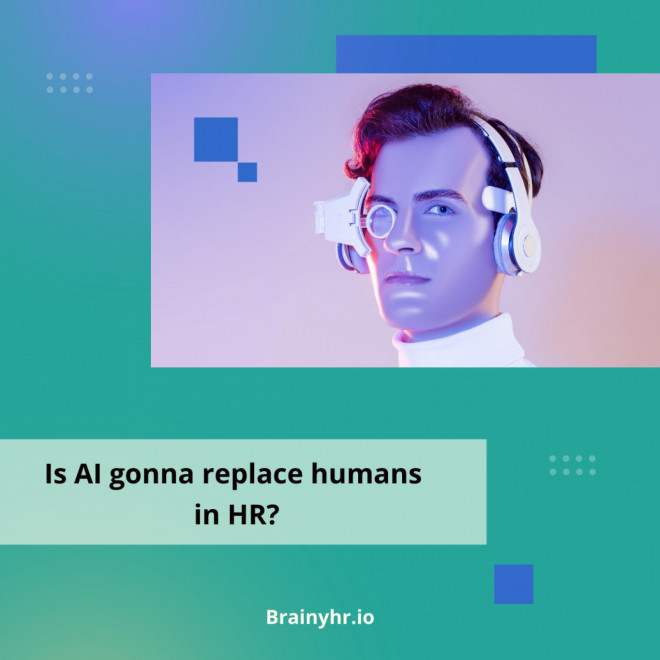When you observe the development of technologies and the global digitalization of businesses and many processes, have you ever had a similar question?
Even our team sometimes discusses and thinks about this topic. Technologies have really impacted everyday life and work. In many companies, technology is essential for recruitment, personnel management, and maximizing employee potential, so it's become a big component of HR.
Will AI replace HR workers? Check out our new article for the answer.
Do you want to regularly receive a portion of new information in the Business & HR World? Read only relevant and useful articles bysubscribing to our blog.
AI can make specialists' lives easier and more efficient, not as a direct competitor.
Well, then let's consider the functions of AI in HR.
TOP 5 AI functions that are guaranteed to increase the efficiency of the HR department:
- AI helps save time
AI helps recruiters and HR departments save time and increase efficiency. HR managers who don't use automation for tasks like payroll, candidate tracking, training, job postings, and more say they lose an average of 14 hours per week doing these tasks manually. If your organization isn't using AI software to automate at least some aspects of HR, you could be wasting time and money.
If searching for effective and user-friendly HR software is an urgent task for you, you can try our HRIS Brainy HR, which is ideal for medium and small businesses. Get free access to the demo version for 7 days and feel the power of technology.
- Enhance the employee experience with chatbots
Bots and AI-powered assistants have been around for a while now, and their presence in our work lives will only increase. According to research, 50% of IT workers will use virtual assistants on a daily basis by 2025, up from 2% in 2019. There are many potential uses for workplace chatbots and AI assistants—answering candidate questions during the hiring process, offering new hires extra help during onboarding, and providing instant answers to employee questions. So take it into consideration and start using it in your work.
- AI can check thousands of apps
Unfilled vacancies can drain your team and hurt morale. It's important to close vacancies on time and professionally.
Sorting incoming CVs is not an easy task if you entrust this work to a human. After all, any specialist can make a mistake.
With artificial intelligence, HR departments can save up to 23 hours per hire by analyzing incoming applications and using algorithms to assess applicants' skills, knowledge, and experience. It is also important that artificial intelligence will not make mistakes that a human can make.
- With AI, you can hire more qualified candidates, which improves retention and productivity indicators
As well as speeding up the selection process and providing valuable analytics, AI helps match candidates to jobs. Artificial intelligence algorithms can identify the traits of successful employees and search for candidates with similar characteristics for specific positions.
- AI improves employee engagement and builds better relationships
The application of AI goes beyond recruitment. Artificial intelligence is optimizing common business processes and virtually eliminating human error in everything from scheduling meetings to training employees.
Why won't AI replace people in HR despite its strengths?
We can see from what was written above that artificial intelligence has strengths and can do some jobs better than humans. Human resources management is becoming increasingly dependent on technological and digital solutions. More and more companies, from small to large, are purchasing HRIS solutions. Consequently, all personnel specialists must be capable of using HR software.
However, artificial intelligence is only a tool, not a complete solution. When it comes down to it, all these strengths of technologies are united by one thing: they all require some kind of human intervention. Only humans can understand other people's needs, problems, and motivations. High-tech machines can't replace this natural ability. Additionally, it is important to understand that artificial intelligence is likely to continue to expand its influence in the future. HR specialists must accept the need and importance of automation, as well as coexisting with technology.
So, it is necessary to conclude that there is no need to be concerned about the fact that AI will completely replace human labor in Human Resources since this will not occur. However, it's important to understand the power, opportunities, and growing influence of technology in HR, and to keep up with trends and learn new digital tools. By the way, you can read our article on HR tech trends in 2023 here.
The use of artificial intelligence will not replace HR professionals, but it will enhance their ability to be highly effective and strategic in their roles.
If you understand the importance of technology in your business and want to try using HR software, follow the link and leave your contacts. You will be able to get free access for 7 days to our automated HR platform. You will also be able to receive professional advice and answers to your questions regarding automated HR solutions tailored to your needs.
Summary
AI won't replace HR specialists, that's for sure. Machines can do a lot, but HR needs the human skills, knowledge, and empathy that only humans have. The use of artificial intelligence will not replace HR, but it can significantly enhance it.
AI provides an opportunity to deploy HR skills completely new and experimentally. HR professionals must learn to coexist effectively to improve the field.
It's crucial that specialists use technology in their work, follow the trends of digital HR solutions, and develop new skills.
Hope you enjoyed our article and found answers to your questions. Follow our blog and will be the first to hear about the latest HR tech.


 Posted on Dec 21, 2022 by Lillia
Posted on Dec 21, 2022 by Lillia


